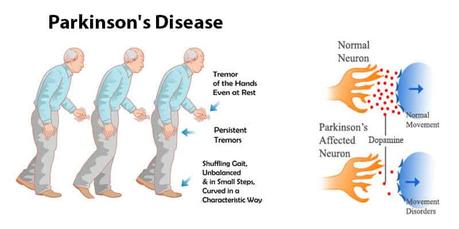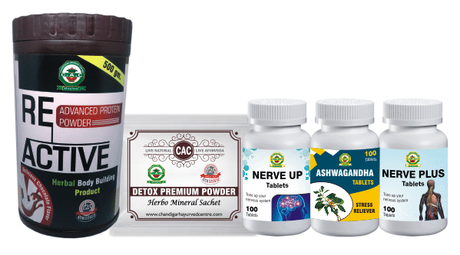
Parkinson’s is a brain disease, in which the activities of various body parts are adversely affected. Significantly, neuron cells in the brain form a chemical substance called dopamine. When dopamine levels begin to fall, the brain is unable to control various organs of the body.
Often this disease occurs in old age people, but nowadays this merge is also seen in the youth. According to statistics, around 70 million to 10 million people are currently affected by Parkinson’s disease. These data suggest that this number will increase even more, especially in the continent of Asia. The reason for this is to increase the number of elderly and increase in age.
Parkinson’s disease is often associated with depression or brain failure, but in this context, it is very important to understand that patients suffering from this disease are not mentally challenged. They should not be seen as separate from society. At the initial stage, doctors resort to medications to manage the symptoms, but in the end, Deep Brain Stimulation (DBS) therapy has proved to be very effective if the medicines are not effective and their side effects are revealed.
Symptoms of Parkinson diseases
- Feeling lethargic in physical activity
- Feeling difficulty in balancing the body
- Feeling difficulty in balancing the body
- Feeling difficulty laughing and blinking eyelids
- Speech problems and difficulty writing
- Hands, arms, legs, jaws, and muscles
- Problems such as depression, insomnia, chewing, swallowing, or speaking may also occur in such victims.
- Tremor is the major symptom of Parkinson’s disease, but 20 percent of patients do not have this symptom.
- When the symptoms get worse, the person suffering from this disease has trouble walking and talking.
- Symptoms of its particular identity are tremor, tightness, slowness at work, change in pace, difficulty in physical balance (balance). This disease is also often called a motor disorder or movement disorder (a disorder in movement).
Diagnosis:
Identifying Parkinson’s is not easy. There are no laboratory tests (blood tests or brain scans). Usually, doctors tell about this disease only after seeing its symptoms and the condition of the patient. Neuro physicians come to the conclusion based on their prior experiences and talk to the patient’s family to determine whether the person is suffering from Parkinson’s.
Cause of Parkinson
There is a general belief that Parkinson’s merger is caused by a lack of brain chemical called dopamine produced by nerve cells (nerve cells) in the brain. As the disease progresses, the amount of dopamine produced in the brain decreases. Due to this, the person becomes unable to control his physical activities normally. The cause of Parkinson’s disease can also be genetic. Similarly, due to environmental reasons, increasing age and unhealthy lifestyles can also call this disease. The disease is more common among men than women.
Parkinson’s disease is caused by a disorder in some parts of the brain.
Many symptoms of Parkinson’s are not related to walking or movement. Examples- Mood disorders, problem concentrating, inability to plan, memory problem, vision confusion, difficulty in urination, loss of smelling ability, sleep problem, etc.
Parkinson’s disease is a progressive disorder. Most cases of this occur in older people, but it can also happen at a young age. There is difficulty in swallowing, and it becomes difficult to give the right amount of water and nutritious food. People with Parkinson’s may also suffer from dementia and depression in the advanced stages.
Natural treatment of Parkinson diseases
- High-fiber foods such as vegetables, cooked dry peas and beans (pulses), whole-grain foods, bran, oatmeal, pasta, rice, and fresh fruits
- Drink plenty of water.
- Eat light, soft foods (such as salty crackers or plain bread).
- Daily intake of vitamin supplements.
Avoid :
- Protein – High protein derived from meat, fish, eggs, cheese, yogurt, nuts, beans, and pulses.
- Discard fried, smooth, and sweet foods.
- Do not mix cold and hot food.
- Do not consume orange and grapefruit juice
- Limit the use of sugar and reduce the use of salt.
- Do not drink alcohol
Yoga and exercise
- Exercise is considered an essential part of managing the symptoms of the disease. The following exercises can be done to relieve symptoms: cycling, swimming, walking, dancing.
- The following stretching and flexibility exercises help relieve muscle stiffness, increase flexibility, and make day-to-day work easier:
- Stand 8 inches away from the wall and put your arms up. Next, place your hands on the wall for balance and emphasize your arms and back.
- For support, place your back against the wall and walk in the same place keeping the knees as high as possible.
- Sit on the chair with a high and straight back and pull your arms behind the chair, move your shoulders as far back as you can. While you are pulling, raise your head towards the ceiling.
- While sitting in a chair, hit your feet up and down as well as move your arms up and down on both sides.
Yoga
- Upward signing from Tadasana
- Uttanasana
- Virabhadrasana
Music and meditation
Meditation techniques promote changes in thoughts, understanding, and moods, and they are:
- Vipassana Meditation
- Careful attention
- Passage meditation (a method of meditation)
Natural remedies for Parkinson
- Take long steps, walking straight in front, take care of the proper type of heel and finger.
- Keep the feet at least 10 inches away while walking and turning so that the body can get more support and reduce the risk of falling.
- Do not wear rubber-bottomed shoes, they cling to the floor and increase the risk of falls.
- Drink beverages slowly.
- Instead of taking drinks during the meal, take it in between the meals.
- Take small amounts of food frequently and eat slowly throughout the day.
- Take more rest.
Ayurvedic treatment for Parkinson Diseases

1. Detox Premium Powder
This powder is made up of the composition of bhasmas and pure herbs that is very beneficial in controlling the symptoms of Parkinson’s disease. The powder includes Giloy satav, Sutshekhar rasa, Sudhyog tablet, Shwet parpati, Shankh bhasma, Parwal pishti, etc. It is a very useful remedy to cure the voice change, uncontrollable movements during sleep, improve the rigid facial expression, etc.
Recommended Dosage: Take 1 sachet twice daily with normal water.
2. Nerve up tablet
Nerve up tablet is a herbo-mineral tablet and is the purely ayurvedic formulation. CAC Nerve up tablets helps in balancing the Vata doshas. It reduces Kapha dosha and acts as a nervine stimulant. It shows effective results in improving the central nervous system. It contains natural ingredients like shudha kuchala, shudha shilajit, abhrak bhasma, praval pishti, shankh bhasma etc. These contain natural vatahar properties and helps in curing Vata diseases.
Recommended Dosage: Take one tablet twice daily after meals.
3. Ashwagandha tablet
Ashwagandha tablet is an herbal and purely ayurvedic formulation. Ashwagandha has been called the kings of Ayurvedic herbs. Its root has a horsey smell. It boosts your immune system and relieves stress. It is made from the goodness of Ashwagandha also known as Indian ginseng. It helps you recover from anxiety and depression, boost your brain. It may also modestly enhance strength performance, improve glucose metabolism, increase testosterone levels It is a good antioxidant, anti-inflammatory, anti-diabetic, anti-cancer, and anti-stress properties. It is useful in Arthritis, Constipation, Increase muscle mass, and strength. It lowers cholesterol and triglycerides level too.
Recommended Dosage: Take one tablet twice daily after meals.
4. Nerve Plus tablet
Nerve Plus tablet contains Ghritkumari, kalimirch, Giloy satva, Shudha shilajeet, Shudha Kuchala, Shudha Vatsnabh, etc. These herbs might be beneficial in improving appetite by increasing intestinal motility as well as gastrointestinal functions and also help prevent constipation. It might be good for diabetics due to the presence of certain constituents that help lower blood glucose levels. Kuchla also helps to manage insomnia by controlling the functions of the brain and reducing stress. It is also beneficial in managing urinary problems like burning sensation or irritation during urination due to its diuretic activity.
Recommended Dosage: Take one tablet twice daily after meals
5. RE-ACTIVE POWDER
It is a herbo-mineral powder and is purely Ayurvedic formulation. CAC RE-ACTIVE POWDER is an herbal supplement for bodybuilding and weight management without any side effects. It is a health supplement for daily use. The re-active powder contains herbal ingredients such as Ashwagandha (Withania somnifera), Shatavari (Asparagus racemosus), Safed musli (Asparagus abscendens), Salam Panja (Orchis lalifolia), Vadari Kand (Puerania tuberosa), Shudh Shilajeet (Asphaltum punjabianum), Kaunch beej (Mucuna prurita), etc. These herbs help to maximize Stamina, provide extra bone strength, calms the brain, maximize anabolic activity, and maximize muscle growth and power, balances hormonal levels. Herbal Re-active powder is a Delicious Chocolate flavored Health and Brain tonic for both children and adults. It helps to Maximize muscle mass and strength, Manages weight, Repair damaged tissue, Maximize Stamina, and Provide extra bone strength.
Dosage: 10 GM Twice a day with lukewarm milk or water.
